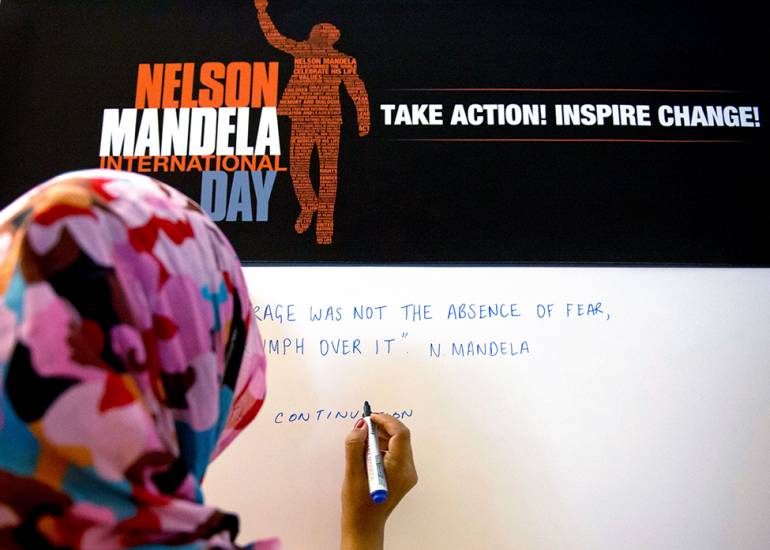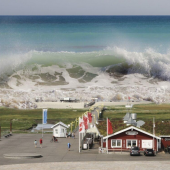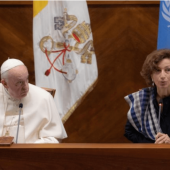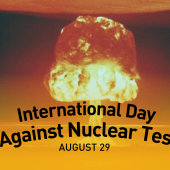Nelson Mandela International Day

Nelson Mandela International Day, often known as Mandela Day, is an international celebration held annually on July 18 to honor the revolutionary Nelson Mandela. Mandela Day was established by the United Nations (UN) in November 2009, with the first celebration on July 18, 2010.
Mandela was born on July 18, 1918, and died on July 18, 2013, at the age of 95, having lived through South Africa's stormy years.
He initiated nonviolent protests against apartheid as a member of the South African Communist Party. Later, he helped create a militant group and conducted a sabotage campaign, for which he was caught, convicted, and sentenced to life in prison.
His 27 years in prison transformed him, and after President F. W. de Klerk released him in 1990, he collaborated with him to promote reconciliation and the peaceful end of apartheid.
For their efforts, both were awarded the Nobel Peace Prize in 1993. After the multiracial general election in 1994, Mandela became President and head of state.
He dedicated his life to empowering women and men of all religions and ethnicities and promoting dialogue and solidarity for justice and long-term peace.
In 2009, UN General Assembly passed resolution A/RES/64/13, which made July 18 Mandela International Day. This was to honor his work for peace and culture.
The UN also recognizes his contributions to "conflict resolution, race relations, promotion and protection of human rights, reconciliation, gender equality, the rights of children and other vulnerable groups, the fight against poverty, and the promotion of social justice."
The UN General Assembly expanded the scope of Mandela Day in 2015. The day's focal themes also included humane conditions of confinement, considering convicts as members of society, and recognizing the contributions of prison employees.
In an article, “Seven Ways Nelson Mandela's Legacy Still Resonate Today”, Rueckert, Brand, and Sepehr (2018) talk about how Mandela fought for Global Citizenship, women's rights, access to good education, and preventing HIV/AIDS.
1. He introduced hundreds of women to the political realm
In 1994, when he gave his first "State of the Nation" speech, Mandela said he was committed to the "emancipation" of women and called for equality in all South African systems.
Mandela said, "It is of the utmost importance that everyone in government, including the President, fully understands this: liberation can't happen until all forms of oppression against women end."
"The objectives of the Reconstruction and Development Program will not have been met until the condition of the women in our nation has dramatically improved in visible and tangible ways," he stated, as cited in Global citizen.
When Mandela was elected president, women held only 2.7% of South Africa's parliamentary seats. In 2013, however, less than two decades later, women comprised 44% of the legislature.
2. He became involved in the HIV/AIDS fight
As president, Mandela and some of his staff didn't want to admit how bad the AIDS epidemic was, even though it affected about a quarter of people between the ages of 15 and 49 by the year 2000. Mandela's hand-picked successor, Thabo Mbeki, was also known to be an AIDS denier.
However, in 2000, when it became clear how bad the situation was, Mandela joined the activists' calls for the disease to be recognized and for steps to be taken to stop it.
3. He provided rural students with education
Mandela famously said, "Education is the most powerful weapon you can use to change the world." And for Mandela, bringing about genuine educational change began in rural areas.
Mandela set up the Nelson Mandela Institute for Rural Development and Education in 2007 so that good teachers could be trained and sent to rural areas, and schools could get new tools.
The objective of the Institute for Rural Development and Education, which is based in the rural Eastern Cape of the country, is to promote a more sustainable future for future generations and the globe.
4. He battled worldwide for peace and justice
Mandela was a prominent figure in the struggle against the racist apartheid system in South Africa, but his advocacy extended beyond the limits of his nation. After he stopped being president, Mandela tried to teach people about HIV and AIDS in Africa.
Mandela was an inspiration for civil rights movements around the world, especially in the US, for many years before Apartheid ended.
Mandela was the guest of honor at the closing ceremony of the 2010 World Cup in South Africa, even though he was sick. This made one of the most critical events in the world even more memorable.
This is because the hero who came out of a tiny jail cell to help end Apartheid, gave rights to millions of oppressed South Africans, and healed a broken country had already been a symbol of peace and justice around the world for a long time.
In his general message of 2022, António Guterres, the UN’s Secretary-General, called Mandela a giant leader of our time, a leader of unparalleled courage and towering achievement, and a man of quiet dignity and deep humanity.
He was a healer of communities, and a mentor to generations, said Guterres. "He remains a moral compass and reference to us all."
Further, Guterres said, "Madiba walked the path to freedom and dignity with steely determination, compassion, and love." "He showed that every one of us has the ability—and responsibility—to build a better future for all."
Let us find hope in Mandela’s example and inspiration in his vision.
"Today and every day, let us honor Nelson Mandela’s legacy by taking action." By speaking out against hate and standing up for human rights. By embracing our common humanity—rich in diversity, equal in dignity, united in solidarity. And by making our world more just, compassionate, prosperous, and sustainable for all, "Guterres concluded."
Resources:
Phineas Rueckert, David Brand, and Jana Sepehr (2018), “Seven Ways Nelson Mandela's Legacy Still Resonate Today”: https://www.globalcitizen.org/en/content/nelson-mandela-legacy-education-women-health/ (accessed on 16 July 2022).
Nelson Mandela International Day, 18 July, For Freedom, Justice, and Democracy (un.org)
Radio Veritas Asia (RVA), a media platform of the Catholic Church, aims to share Christ. RVA started in 1969 as a continental Catholic radio station to serve Asian countries in their respective local language, thus earning the tag “the Voice of Asian Christianity.” Responding to the emerging context, RVA embraced media platforms to connect with the global Asian audience via its 21 language websites and various social media platforms.














